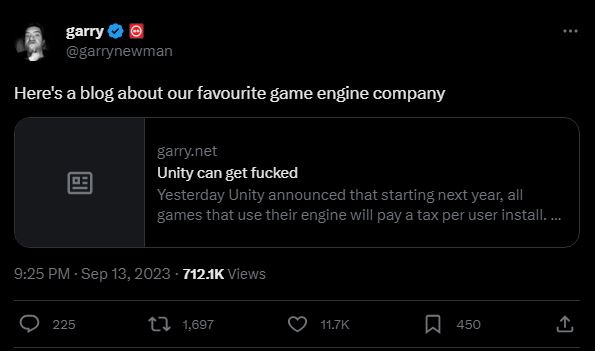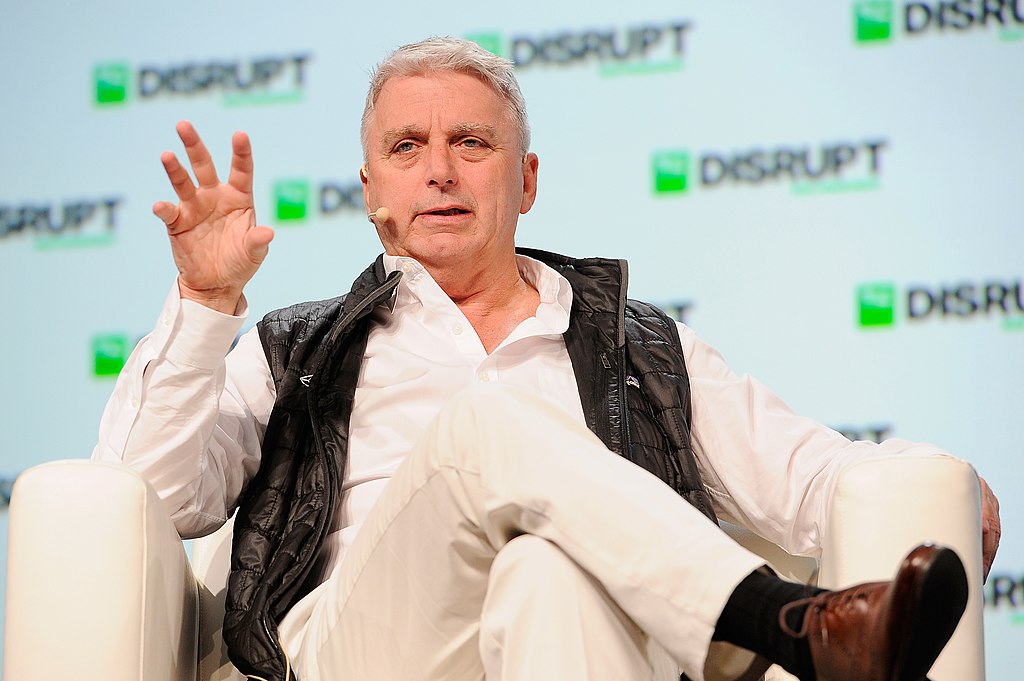One of the essential elements of game development is the software used to develop games. There are numerous game engines out there that we see in modern games, such as Unreal Engine, GameMaker, GoDot, etc. However, what if the very engine that you work with starts taking cuts from your bottom line, and creating a successful game is what leads to a small company going bankrupt?
This is the dilemma the gaming community at large is currently facing as the popular Unity Engine releases a new business model that charges companies per installation, not per sale. Here’s our take on this disgusting new business practise and why it should be stopped as soon as possible.
What Is Unity?

If you’ve been on the gaming side of the internet for some time, you’ve most likely heard of Unity. For those unfamiliar with it, Unity is one of the largest and most used game engines to date, and the vast majority of games are made with it, including titles such as Genshin Impact, Among Us, Cult of the Lamb, Dredge, Slender: The Eight Pages, The Pale Beyond, Volcano Princess, Mars First Logistics, Beat Saber, Cuphead, and even Pokemon GO.
This software has existed for a decade and a half, but despite its age, the engine has received several updates to keep it fresh, therefore making it appealing to new and old developers alike. However, following Unity’s recent announcement and update, many wish that Unity would stop updating all together.
New Policy

On Tuesday, 12th September, Unity released an official statement on their official blog stating their new prices and policies. They announced that once a game has reached a certain threshold, Unity will charge the game developers per subsequent installation, regardless of whether the copy of the game was legally purchased or pirated.
They created a detailed table of how much a developer must pay per installation; however, to be eligible for this, they must first meet the following criteria so that the initial charging may begin:
“Only games that meet the following thresholds qualify for the Unity Runtime Fee:
- Unity Personal and Unity Plus: Those that have made US$200,000 or more in the last 12 months AND have at least 200,000 lifetime game installs.
- Unity Pro and Unity Enterprise: Those that have made US$1,000,000 or more in the last 12 months AND have at least 1,000,000 lifetime game installs.”
This new business plan will be effective on Monday, 1st January 2024, and will have a “separate package” payment depending on whether the game was a demo or was released on console, mobile, or PC. Additionally, this entire fee will work retroactively even though the game is decades old; as long as they meet the minimum requirements and the engine detects another installation, it will charge the developer.

However, this is not the only problematic thing Unity mentioned. Since this additional charge is done per installation and not per sale, game developers get charged even when someone installs a pirated copy of their game. Furthermore, someone can uninstall and reinstall a game repeatedly, racking up an incredible fee for no good reason.
Even worse is when someone automates this and has a bot uninstall and reinstall that game by itself. This conclusion was drawn from the fact that Unity has not given a direct answer to questions regarding piracy, both on X and on their official FAQ page.
The Fallout

Game developers are on high alert with these new practises, as it forces them to revise a lot of their plans, with some even planning on killing their games before it kills the company. One thing developers are worried about is the Xbox Game Pass, a subscription service that lets you have unlimited access to various games. This is a fact that Aggro Crab had to painfully highlight in a post in response to Unity’s change of business practises.
Another beloved game that is facing this threat is Cult of the Lamb. This game broke a new record for it’s innovative and creative gameplay and has attracted various gamers thanks to its cartoonish design. However, since the game is based on the Unity engine, the Cult of the Lamb developers will be deleting the popular game when the new year rolls around as a result of these changes.

The announcement has resulted in a mass outcry among the gaming community, as the changes are simply ridiculous, with some even questioning how ethical they are. Since their bombshell announcement, Unity has received several credible death threats and has decided to close two of their studios for the safety of their staff.
On the business front, Strange Scaffold CEO Xalavier Nelson Jr., known for titles like El Paso, Elsewhere, and Space World Organ Trading Simulator, wrote on X that “at least one significant group of developers is talking a class-action lawsuit against Unity.”

According to Nelson, there’s only one group that seems to be interested in taking them to court so far, but that number will most likely grow as Iron Lung developer David Szymanski asks how to get into contact with the said group. Individuals such as Garry Newman, founder of Facepunch Studios, known for games such as Garry’s Mod and Rust, have been very vocal about these changes, and he has even added an entry about the game engine to his personal blogs, which he publicly displays on his X page.
Hot Take

To say that this is big news in the gaming world and calling it “greedy” would be an understatement. People have started believing this was intentional, as it was reported that Unity CEO John Riccitiello sold 2,000 of his shares a week before the announcement was released. However, there have been reports that he has sold several other stocks and bought none, seemingly debunking the theories.
At the end of the day, no one except Unity will stand to benefit from this, as it punishes big and small companies alike – but the latter would be hit the hardest as it punishes them for succeeding. If this is not shot down while the opportunity still exists, it will force companies to adapt and increase their prices to break even, and free games, like Genshin Impact, may no longer be free.
Many people are banking on game developers to come together to boycott Unity, if not outright sue them, as this needs to be stopped before it normalises. They want major companies, such as Nintendo, to put it down and use the time to move to a better, more respectable game engine.
Sources: Unity [1], [2], X [1], [2], [3], [4], [5], [6], Ars Technica, Rock Paper Shotgun, UploadVR, Fortune, Siliconera, GameSpot, GameWorldObserver, Game Rant, IGN South East Asia
Image Sources: Flickr, Wikimedia Commons
The post Gaming: Our Hot Take On Game Engine Unity’s Disgusting New Business Model appeared first on Hype MY.


